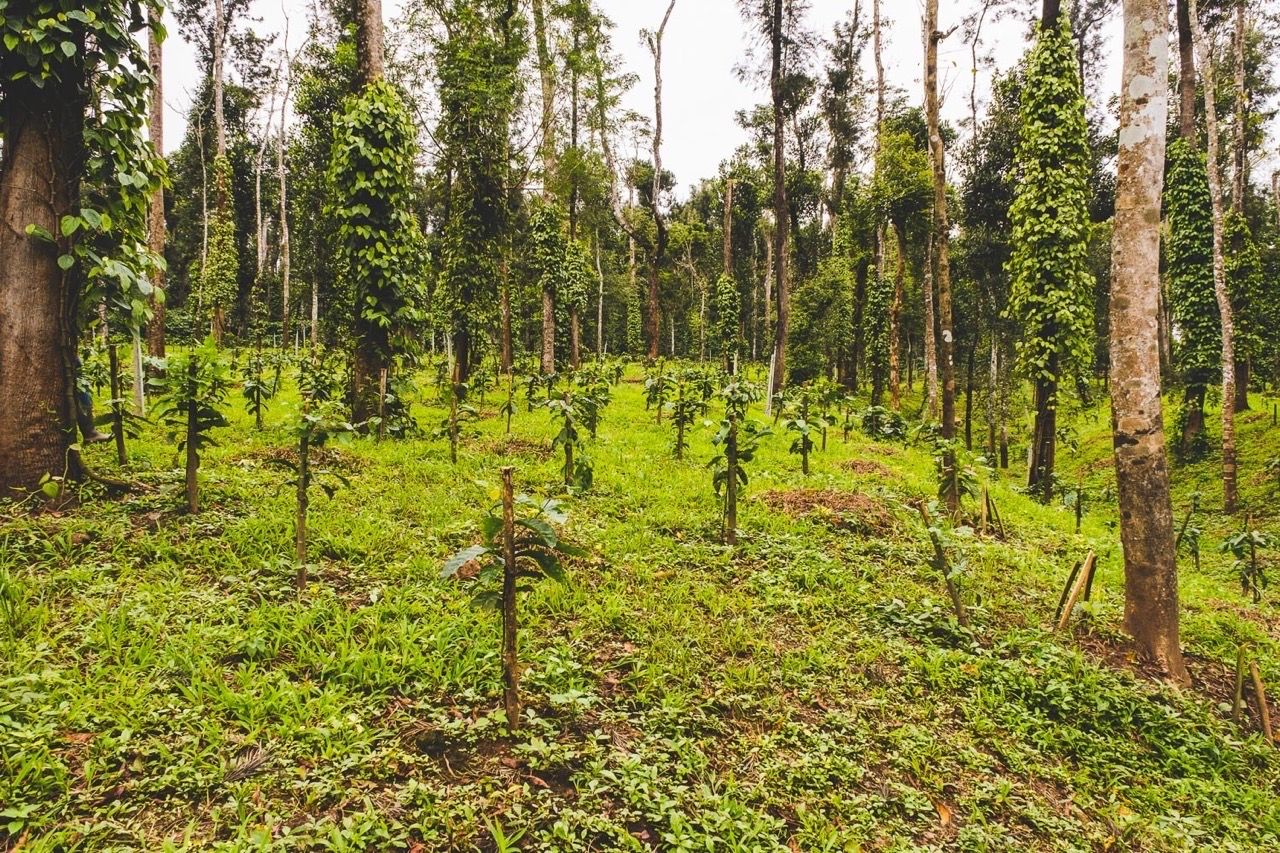Because Coffee and Pepper and Cardamom Must Live
Even as they demand the best coffee, buyers want to be assured that God’s creatures are teeming on your property. We have good news for them.

You spray Imida to eliminate the mealybug from the back of the pepper leaf. The bug colonies are small patches of white, and their damage shows as yellow blotches on top of the green leaf. When alive, if you rub on a patch, it stays fast to the leaf with increased adherence, thanks to living fluid in the organism. When dead, the powder is dry, and it’s gone when you blow on it. That’s the test to see if the Imida you’ve sprayed has killed the mealybug.
Then there are the borers: the shot-hole borer, the stem borer, the shoot borer. Every one of them must die. You use Regent (Bayer), and neem oil; and amla — there’s a poison for every enemy of the crop. The coffee plant must live, for instance. It must thrive with its leaves a deep sap green, its berries gleaming red and succulent when ripe.
Even as they demand the best coffee, buyers want to be assured that God’s creatures are teeming on your property. We have good news for them: we have wild hare; the boar; the elephant; the civet; peafowl, snake, mongoose. Such reports in their files make the buyers tolerable to the activists.
And we have the wild bee, which also Imida kills. So Bayer, the makers of Imida, say their drug shouldn’t be used when the crop is in blossom and when the bees are foraging. They’re making an effort to sound the kindest they can.
I have asked the plantation manager to install bee-boxes so we can grow bees on our plantation. He is working on it. Things happen in their own time in coffee country, but they happen.
I’m writing this at Starbucks on VM Road, in the heart of Bangalore. There’s Ella Fitzgerald’s voice wafting down from the speakers above. ‘Don’t Worry ‘Bout Me,” Ella is saying so well in jazz. I’m fine, too, warmed by a blonde-roast Americano. Outside, it has been raining all day.
I am writing plantation stuff, with the city claiming my mind at the moment.
My Luca is a beagle. He has a preference for the hare in his brain, bred as he is to hunt the small, speedy thing. We take Luca to the plantation to give him a place where to roam free. But he has to stay on the leash for fear he will run with the scent of the hare and lose himself somewhere. The hares have grown well on country fare. Some workers from the labour lines lay ingenious, mean-looking traps for them in the clearings.
“We make our coffee with love and care,” the store manager is telling a young lady in training. She’s taking that in seriously. He moves on to the difference between robusta and arabica. “It’s easy to tell,” he says to her and explains how. “But we use only arabica. From our own estates.”
The Tatas, with whom Starbucks operate as a joint venture in India, run colossal coffee and tea estates.
The Starbucks manager’s name is Elam. He is tall and dark and muscular and has neatly filled out his black uniform. He is delivering training in English in a delicious Tamil accent over yellow cheesecake and a jigger of what looks like a real strong brew.
I must leave Bangalore, go to the plantation. It is picking time, and besides rain threatening the crop that we’ve grown with love and care, there’s the problem of labour. This is when plantation workers earn the most in the year, with wages high and the hours longer. Quite often, the smaller landholders pay high and take the labour away.
On the long seat back of me, the caffeine has gotten a bunch of girls. Their giggles have ascended to a high pitch, to squeals. These are times when one should be happy seeing happy people, but I’m leaving. It is raining, but I’m carrying an umbrella.
